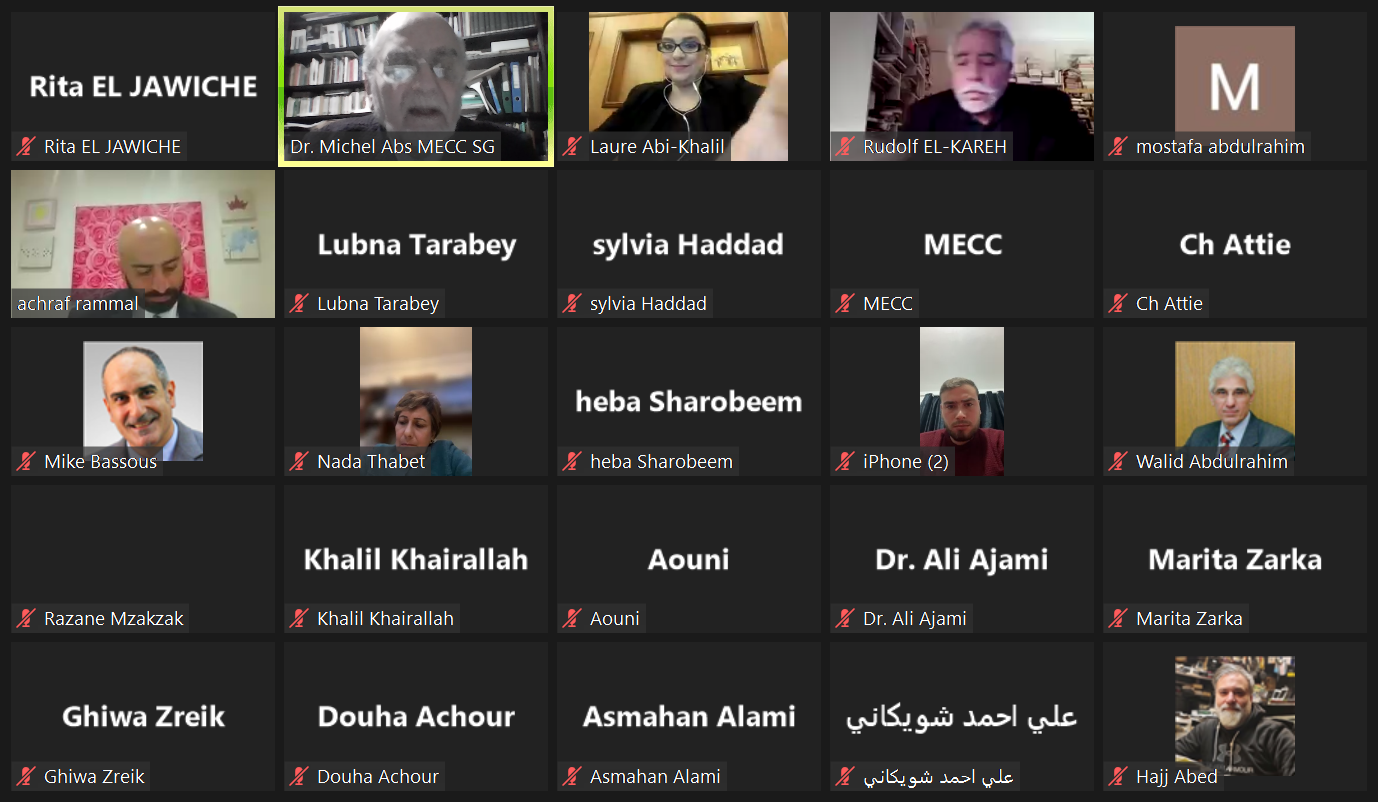“Medical Ethics and Human Dignity”
The New Monthly Webinar Organized by MECC
Secretary General Dr. Michel Abs: what matters the most is that the principles included in the laws and regulations turn into a culture and be integrated in the value system of the medical field, as in any other professional field
The Middle East Council of Churches held its monthly webinar, under the theme of "Medical Ethics and Human Dignity", on Thursday 23 February 2023, with the participation of researchers, specialists, experts and students from various universities and countries. Noting that this webinar was organized within the series of monthly webinars MECC has launched within the “Human Dignity Project” as part of the work of a department that is being developed in MECC under the name of “Dialogue and Social Cohesion-Social Capital Rehabilitation”.
The webinar was broadcasted live on the MECC Facebook Page and included 3 sessions on the topic at hand. It was moderated by Dr. Laure Abi Khalil, who presented in her opening note an introduction of the human dignity and medical ethics’ concept and meanings.
The webinar started with a speech delivered by the MECC Secretary General Dr. Michel Abs, in which he spoke about medical laws and professional ethics that preserve human dignity, and said, “In order to prevent error and mistakes, if any, it was necessary to secure a control based on two elements: the first element is the legal one that regulates the profession and sets control mechanisms. The second element is the moral one that guarantees the implementation of laws and regulations as well as the respect for the needed controls.”
He added, "What is important in all of this is not only the enactment of laws, the establishment of regulations, and the preparation of procedural measures, nor also the establishment of committees... But it is also important that all these matters turn into a culture that inspires people in their actions and guides them in towards the right path... The important thing is that the principles included in the laws and regulations turn into a culture and be integrated in the value system of the medical field, as in any other professional field, so that the control comes from people, their minds, remorse and values.
He continued, "It is imperative, therefore, that professional and medical ethics as well as other fields become a culture inasmuch as they are laws and tools of reward and punishment... A culture that defines the limits of honor and shame in practicing any profession, noting that the medical profession is the most dangerous one... This approach in our thinking is part of building the social capital…”
Dr. Abs ended, “Those who supervise the profession of medicine, and those who practice medical ethics in their daily lives, do not do so for fear of punishment or blame, nor in search of praise, but because their culture and values make them behave properly in the appropriate way because this culture and these values have become part of their being.”
Then, the first session began, under the title of “Protection of Medical Law for Medical Ethics and Human Dignity,” with Professor Achraf Rammal, Lecturer and Researcher in Medical Law at the Lebanese University. He discussed the medical law’s protection for medical ethics and human dignity. During the session, Prof. Rammal highlighted the basic rights of patients included in various international conventions and local countries’ legislation such as the patient's right to medical care, his or her right to obtain information, the need for the patient's consent to medical work, the patient's right to respect her/ his personal life and the confidentiality of her/ his information, as well as the right of the patient to check her/ his medical file.
As for the second session, it focused on “Time and End of Life-Prolonging Treatments in Intensive Care Units in Lebanon,” with Dr. Rita Gawish, an Anesthesiologists and Intensive Care Specialist. She presented the results of a study she made about the attitudes and practices of intensivists working in Lebanon regarding withholding and withdrawing life-sustaining treatments (LSTs). Dr. Gawish also indicated that the study aimed to assess the points of view and practices of intensivists in Lebanon along with the opinions of medical, legal and religious leaders regarding withholding withdrawal of life-sustaining treatments in Lebanese intensive care units (ICU).
The third session was entitled “Medical Cannabis in Lebanon: History and Therapeutic, Ethical and Social Challenges”, with Dr. Mostafa Abdel Rahim, a Researcher in the Department of Neurosurgery at Johns Hopkins University in the USA. During the session, Dr. Abdul Rahim presented an introduction of medical cannabis and its uses, highlighting its history and legalization in Lebanon. He also discoursed about the medical uses of cannabis, as well as its therapeutic, ethical and social challenges facing medical cannabis prescription. This is in addition to the Christian and Islamic views of this issue.
The webinar ended with a session for question and discussion between the participants. The MECC Secretary General Dr. Michel Abs made an intervention in which he stressed that scientific research in the medical field includes many limitations. On the other hand, he indicated that MECC will be holding another seminar within this context as a follow up to what was presented in this webinar on “Medical Ethics and Human Dignity”.







